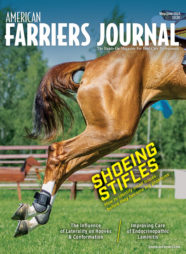New research has found it is possible for the owners of working horses to make changes that improve the welfare of their animals without threatening their own livelihoods.
Working equids commonly suffer from lameness, often affecting all four limbs at the same time.
The 2-year project, led by academics from the University of Bristol’s School of Veterinary Sciences and funded by global equine welfare charity The Brooke, worked with horse owners in Jaipur, India, to try to reduce levels of lameness in their horses.
The project used participatory methods, which were designed to empower horse owning communities and individuals to find ways of tackling the causes of lameness in their own animals.
The study, led by Dr. Becky Whay, recruited 439 owners of 862 horses, either as part of an intervention group or a control group.
The results of the project were evaluated in terms of reductions in lameness severity and limb abnormalities in the intervention group compared to the control group.
The researchers were able to assess these issues on three occasions throughout the study in 149 horses.
The participatory intervention group owners from 21 communities were encouraged to meet regularly to discuss management and work practices influencing lameness and poor welfare and to track their own progress in improving these.
The intervention succeeded in reducing the amount and severity of lameness in the intervention group communities. This was achieved by owners finding ways to make changes in how they managed and worked their horses and the participatory method used encouraged owners to support each other in implementing these changes.
“This research is extremely important in that it shows that it is feasible and possible to improve the welfare of animals, despite their owners living in quite profound poverty,” says Whay, reader in animal welfare and behavior in the School of Veterinary Sciences. “The key to the project is the use of participatory methods that directly involve the horse owners and put them in control of the changes they make to the management of their animals.
“The research team also believes this is the first study of its kind to quantify the impact of a participatory intervention on an animal welfare issue.”
Reix CE, Dikshit AK, Hockenhull J, Parker RMA, Banerjee A, Burn CC, et al. (2015) A Two-Year Participatory Intervention Project with Owners to Reduce Lameness and Limb Abnormalities in Working Horses in Jaipur, India. PLoS ONE 10(4): e0124342. doi:10.1371/journal.pone.0124342







Post a comment
Report Abusive Comment